牛津译林版五年级下册英语期中知识点归纳
(完整版)译林版五年级下英语知识点
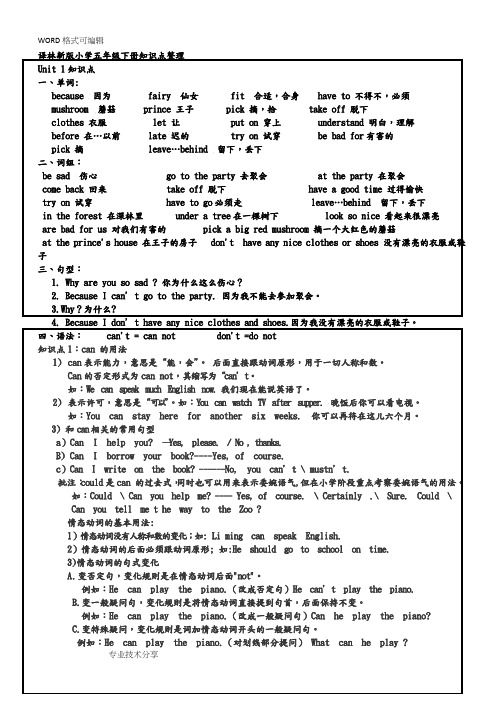
译林新版小学五年级下册知识点整理Unit 1知识点一、单词:because 因为 fairy 仙女 fit 合适,合身 have to 不得不,必须mushroom 蘑菇 prince 王子 pick 摘,拾 take off 脱下clothes 衣服 let 让 put on 穿上 understand 明白,理解before 在…以前 late 迟的 try on 试穿 be bad for有害的pick 摘 leave…behind 留下,丢下二、词组:be sad 伤心 go to the party 去聚会 at the party 在聚会come back 回来 take off 脱下 have a good time 过得愉快try on 试穿 have to go必须走 leave…behind 留下,丢下in the forest 在深林里 under a tree在一棵树下 look so nice 看起来很漂亮are bad for us 对我们有害的 pick a big red mushroom 摘一个大红色的蘑菇at the prince's house 在王子的房子 don't have any nice clothes or shoes 没有漂亮的衣服或鞋子三、句型:1. Why are you so sad ? 你为什么这么伤心?2. Because I can’t go to the party. 因为我不能去参加聚会。
3.Why?为什么?4. Because I don’t have any nice clothes and shoes.因为我没有漂亮的衣服或鞋子。
四、语法: can't = can not don't =do not知识点1:can 的用法1)can表示能力,意思是“能,会”。
后面直接跟动词原形,用于一切人称和数。
2020年牛津译林版小学英语五年级下册期中知识点归纳

五年级下册各单元考点总结U1【重要词组和例句】1.穿上新衣服put on the new clothes2.不得不走have to go (have to +动原)Helen ______ (have) to ______ (do) her homework.3.试穿他/他们try it/them on★代词it/them放中间try的三单tries同类词组:put on /take off1)This pair of shoes is nice. Can I try ____(it/them) on2)Whose shoe ________ the girls ________(try) on.4.让我来帮你let me help you (let +动原,动词后用宾格) (祈使句否定句首+don’t)-Su Yang,this hat. --All right.A. try onB.tries onC. try it on为什么你看上去如此伤心why do you look sad?6.非常适合我fit me well1)The shoes fit every one. A. doesn't B. don't C. isn't2)I often ______ on Sundays, but my sister ______.A. swim; doesn’tB. swimming; doesn’tC. swim; don’t7.上学迟到be late for school8.想要做某事want to +动原= would like to +动原1)Would you like mushrooms? A. some B. any C. a2)He ______ (want) ________ (see) a film.9.对……有害/有利be bad/good for…1)Reading our study. A. are good for B. is good for C. is bad for2)Water good for . A. are;us B.is;our C.is;us10.留下……le ave…behind灰姑娘留下了什么?—她留下了一只鞋。
牛津译林版小学英语五年级下册期中复习知识点

五牛津译林版年级下册期中复习知识点【重点单词】1.let:常用短语let sb.do sth.让某人做某事eg:Let me help you.让我帮你吧。
2.before:a.常用短语:before class上课之前,before dinner晚饭前b.反义词:after在…之后(表时间)c.易混词:before表时间,在…之前;in front of表方位,在…前面。
te:a.可做形容词,也可做副词,表示“迟地,晚地”;易混淆词:lately是副词,表示“最近,近来”b.反义词:early早的c.常用短语:be late for迟到be too late太晚了eg:Sorry,I am late for work.抱歉,我上班迟到了。
4.pick:a.常用短语pick apples摘苹果,pick up捡起,拾起b.pick up sth.=pick sth.up【当sth.为代词,如it,them,this,that,these,those时,代词必须放在中间】eg:He picks up his hat.他捡起了他的帽子。
He picks them up.他把它们捡起来了。
5.by:a.常用短语:by bus乘公交车;by plane乘飞机;by train乘火车;by bike骑自行车by+表示交通工具类单词=表示出行的方式(特例:on foot步行)【注意by后的单词要用单数,不加a/an等任何形容词】b.同义转换:go to...by plane=take a plane to...乘飞机去…6.show:常用短语:show sb.sth.=show sth.to sb.给某人看某物;show…around...带…参观e.g:I want to show you my new clothes.我想给你看看我的新衣服。
=I want to show my new clothes to you.7.street:常用短语:in/on the street在街道上;on…Street在…街e.g:Don't play in the street.不要在街上玩耍。
译林英语五年级下册知识点精选
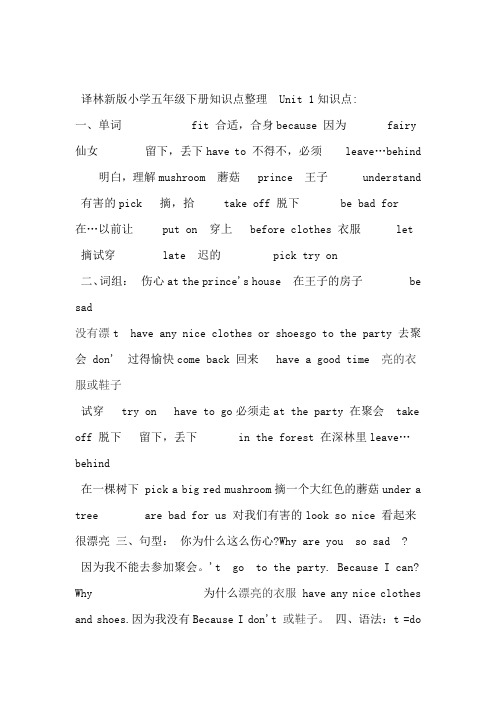
译林新版小学五年级下册知识点整理 Unit 1知识点:一、单词 fit 合适,合身because 因为 fairy 仙女留下,丢下have to 不得不,必须 leave…behind 明白,理解mushroom 蘑菇 prince 王子 understand 有害的pick 摘,拾 take off 脱下 be bad for 在…以前让 put on 穿上 before clothes 衣服 let摘试穿 late 迟的 pick try on二、词组:伤心at the prince's house 在王子的房子 be sad没有漂t have any nice clothes or shoesgo to the party 去聚会 don' 过得愉快come back 回来 have a good time 亮的衣服或鞋子试穿 try on have to go必须走at the party 在聚会 take off 脱下留下,丢下 in the forest 在深林里leave…behind在一棵树下 pick a big red mushroom摘一个大红色的蘑菇under a tree are bad for us 对我们有害的look so nice 看起来很漂亮三、句型:你为什么这么伤心?Why are you so sad ?因为我不能去参加聚会。
't go to the party. Because I can? Why 为什么漂亮的衣服 have any nice clothes and shoes.因为我没有Because I don't或鞋子。
四、语法:t =donot t = can not ? don' can' 知识点Unit 2:一、单词乘………离……远far from near 在……附近by公共汽车,大巴士 on foot 步行 metro 地铁bus taxi 出租车,的士 bike自行车 plane 飞机 ship轮船train 火车 ride 骑车 show 给……看 basket 篮子city城市二、词组:很大 far from school 离学校远 your new home 你的新家 very biglive on Moon Street 住在月亮街上在城市图书馆附近 come to school 来学校near City Library by metro 乘地铁 by bus 乘公共汽车 on foot 步行 can park 在公园里 a taxi driver 一位出租车司机in the by taxi 乘出租车 show his bike to sam 展示他的自行车给山姆看fly 会飞太小(年龄) sit in the basket 坐在篮子里too young三、句型: Where do you live 你住在哪里 /离远…我住在……I live near/ far from…我住在附近I live? How do you come to school? 你怎样来学校的我来学校……I come to school…Unit 3知识点: 单词一、助向……求问路 ask…for help 沿着,顺着along ask the way在……旁边到达 next to full 满的,饱的 get to一会儿见。
五年级下册英语要点总结 1-4单元 牛津译林版

五年级下册Unit 1复习要点1、“there be +存在物+地方”结构表示“某处有某物”在本结构中,be动词只有两种形式(is,are):there is + a/an+ 可数名词单数there is +some+不可数名词(否定句和疑问句时some要改any)there are+可数名词复数注意:“存在物”可以是具体的人或物,也可以是抽象的,如“party”否定句(be动词后加not),一般疑问句,以及特殊问句1)一般疑问句以及回答:Is/Are there+…(讲解时要具体分可数单/复数和不可数三种情况并举例)e.g. Is there a music room? Yes, there is. No, there isn’t.e.g. Is there any milk? Yes, there is. No, there isn’t.e.g. Are there any art rooms? Yes, there are. No, there aren’t.2)How many + 可数名词复数+ are there +方位?如何回答:There are…用How many时必须要接可数名词的复数,但回答有两种:注意只有一个时的回答:There is a/an….e.g. How many classrooms on the first floor?There are two classrooms.或者There is one classroom.问不可数名词多少时用How much …is there…?e.g. How much juice is there? There is …2、can后面加动词原形He can go to the party.(分别改为否定句,一般疑问句以及回答)a pair of gloves/glasses/trousers…3、Why结构以及回答Why+be/do/can(not)…+主语+其它部分?回答用becausehelp+宾格(me/you/him/her/it/us/you/them)4、have的各种用法肯定句:I (you, we, you, they ) have…he/she/it hase.g. I have two animal friends.It has four legs.否定句:have表示“有”现在否定句用don’t/doesn’t have:I (you, we, you, they ) don’t have…he/she/it doesn’t have have no现在等于:don’t/doesn’t have a(+单数)或者don’t/doesn’t have any(+复数或不可数名词)e.g. They don’t have any legs=They have no legs.It doesn’t have a tail.=It has no tail.一般疑问句:Do you (we, you, they) have… Yes, I (we, you, they) do.No, I (we, you, they) don’t.e.g. Do you have an animal friend?Yes, I do. No, I don’t.Does he/she/it have…Yes, he/she/it does.No, he/she/it doesn’t.e.g. Does he have an animal friend?Yes, he does. No, he doesn’t.注意:do和have的变化取决于主语!否定两样东西时用or5、注意there be结构的“有”和“have”有的使用范围是不同的。
五年级下册英语素材期中复习知识点译林版
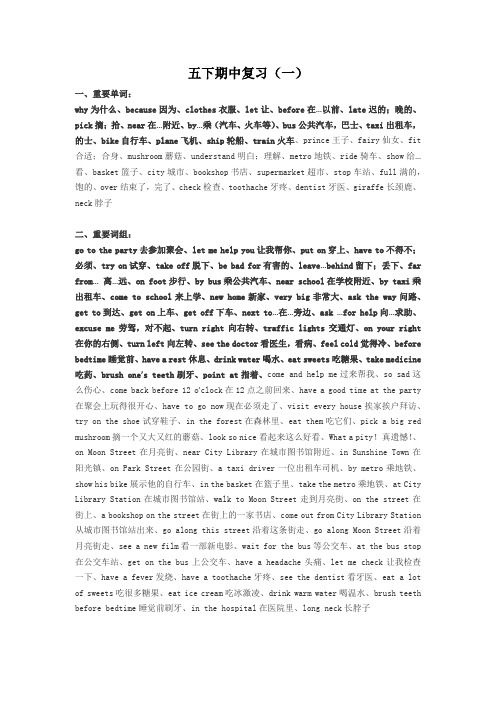
五下期中复习(一)一、重要单词:why为什么、because因为、clothes衣服、let让、before在…以前、late迟的;晚的、pick摘;拾、near在…附近、by…乘(汽车、火车等)、bus公共汽车,巴士、taxi出租车,的士、bike自行车、plane飞机、ship轮船、train火车、prince王子、fairy仙女、fit 合适;合身、mushroom蘑菇、understand明白;理解、metro地铁、ride骑车、show给…看、basket篮子、city城市、bookshop书店、supermarket超市、stop车站、full满的,饱的、over结束了,完了、check检查、toothache牙疼、dentist牙医、giraffe长颈鹿、neck脖子二、重要词组:go to the party去参加聚会、let me help you让我帮你、put on穿上、have to不得不;必须、try on试穿、take off脱下、be bad for有害的、leave…behind留下;丢下、far from…离…远、on foot步行、by bus乘公共汽车、near school在学校附近、by taxi乘出租车、come to school来上学、new home新家、very big非常大、ask the way问路、get to到达、get on上车、get off下车、next to…在…旁边、ask …for help向…求助、excuse me劳驾,对不起、turn right向右转、traffic lights交通灯、on your right 在你的右侧、turn left向左转、see the doctor看医生,看病、feel cold觉得冷、before bedtime睡觉前、have a rest休息、drink water喝水、eat sweets吃糖果、take medicine 吃药、brush one’s teeth刷牙、point at指着、come and help me过来帮我、so sad这么伤心、come back before 12 o’clock在12点之前回来、have a good time at the party 在聚会上玩得很开心、have to go now现在必须走了、visit every house挨家挨户拜访、try on the shoe试穿鞋子、in the forest在森林里、eat them吃它们、pick a big red mushroom摘一个又大又红的蘑菇、look so nice看起来这么好看、What a pity!真遗憾!、on Moon Street在月亮街、near City Library在城市图书馆附近、in Sunshine Town在阳光镇、on Park Street在公园街、a taxi driver一位出租车司机、by metro乘地铁、show his bike展示他的自行车、in the basket在篮子里、take the metro乘地铁、at City Library Station在城市图书馆站、walk to Moon Street走到月亮街、on the street在街上、a bookshop on the street在街上的一家书店、come out from City Library Station 从城市图书馆站出来、go along this street沿着这条街走、go along Moon Street沿着月亮街走、see a new film看一部新电影、wait for the bus等公交车、at the bus stop 在公交车站、get on the bus上公交车、have a headache头痛、let me check让我检查一下、have a fever发烧、have a toothache牙疼、see the dentist看牙医、eat a lot of sweets吃很多糖果、eat ice cream吃冰激凌、drink warm water喝温水、brush teeth before bedtime睡觉前刷牙、in the hospital在医院里、long neck长脖子三、重要句型:(1)询问对方原因的句型及答句:Why are you so sad ,dear?Because I can’t go to the party.(2)询问某人住在哪里句型及答句:Where do you live now?I live on Moon Street,near City Library.(3)询问某人怎样上学的句型及答句:How do you come to school?Su Yang and I come to school by bus.(4)询问如何到达某地的句型及其答句:- How do I get to the ……?- Go along this street. Turn left/right at the ……. Get on/off the bus/metro at……Station. You can see the …… on your left/right.(5)询问对方身体状况的句型及其答句:- What’s wrong with you?- I have a headache. I feel cold.(6)询问医生自己应该怎么办的句型及其答句:- What should I do,doctor?- You should have a rest.(7)询问是谁的句型:Who can’t go to the party?(8)询问在哪里的句型:Where’s the party?(9)询问时间的句型:When does Cinderella have to come back?(10)询问谁的物品句型:Whose shoe do the girls try on?(11)询问在哪里的句型:Bobby wants to show his bike to Sam.(12)建议对方乘坐某种交通工具的句型:You can take the metro.(13)描述两个地方相邻的句型:My home is next to it.(14)表达某件事情结束的句型:…but the film is over. …但是电影结束了。
译林版英语五年级下学期全册各单元知识点复习资料
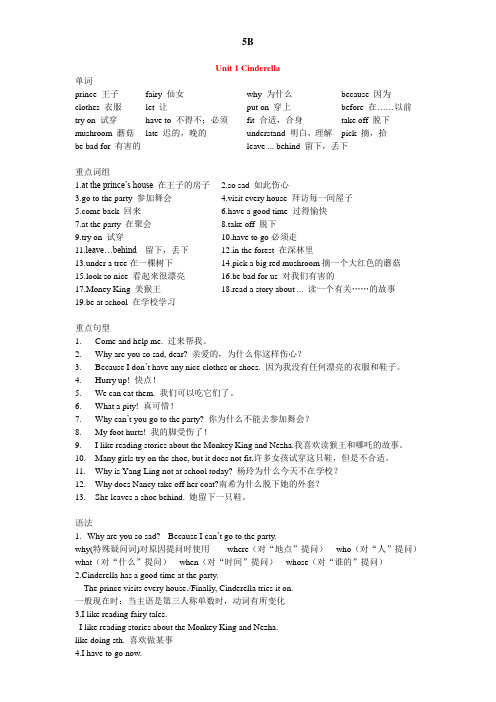
5BUnit 1 Cinderella单词prince 王子fairy 仙女why 为什么because 因为clothes 衣服let 让put on 穿上before 在……以前try on 试穿have to 不得不;必须fit 合适,合身take off 脱下mushroom 蘑菇late 迟的,晚的understand 明白,理解pick 摘,拾be bad for 有害的leave ... behind 留下,丢下重点词组1.at the prince’s house 在王子的房子2.so sad 如此伤心3.go to the party 参加舞会4.visit every house 拜访每一间屋子e back 回来6.have a good time 过得愉快7.at the party 在聚会8.take off 脱下9.try on 试穿10.have to go必须走11.leave…behind留下,丢下12.in the forest 在深林里13.under a tree在一棵树下14.pick a big red mushroom摘一个大红色的蘑菇15.look so nice 看起来很漂亮16.be bad for us 对我们有害的17.Money King 美猴王18.read a story about ... 读一个有关……的故事19.be at school 在学校学习重点句型1. Come and help me. 过来帮我。
2. Why are you so sad, dear? 亲爱的,为什么你这样伤心?3. Because I don’t have any nice clothes or shoes. 因为我没有任何漂亮的衣服和鞋子。
4. Hurry up! 快点!5. We can eat them. 我们可以吃它们了。
6. What a pity! 真可惜!7. Why can’t you go to the party? 你为什么不能去参加舞会?8. My foot hurts! 我的脚受伤了!9. I like reading stories about the Monkey King and Nezha.我喜欢读猴王和哪吒的故事。
新牛津译林版英语五年级下册期中复习知识点
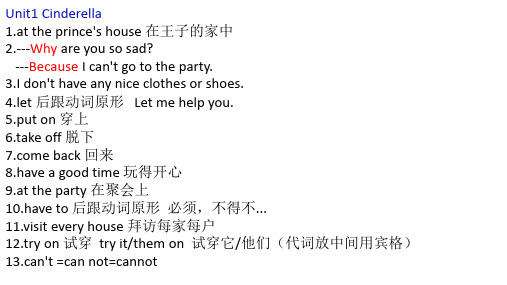
You can take the metro to the park.=You can go to the park by metro. 5.get on... 上车 6.get off... 下车 7.at Park Station 在公园车站 8.at City Library Station 在城市图书馆车站 9.walk to... 步行到...... =go to...on foot
---I live in Sunshine Town. 我住在阳光城。 9.live on Park Street 住在公园街上 10.a taxi driver 一个出租车司机 11.字母tr的发音 train travel tree trousers traffic
12.ride a bike 骑自行车 He likes riding a bike in the park.他喜欢在公园里骑自行车。 He rides a bike to school. =He goes to school by bike. 他骑自行车去上学。
13.want to 想要做某事(后跟动词原形) 14.show...to... 给......看..... show his bike to me 给我看他的自行车 15.too young 太小了 16.Bobby's dad does not think so. Bobby的爸爸不这么认为。
I don't think so. 我不这么认为。 17.sit in the basket 坐在篮子里 18.get there 到那儿 get home 到家 get to school 到学校 unit2四会单词 1.moon 月亮 2.street 街道 3.near 在......附近 4.city 城市---(复数)cities
五年级下册英语-全册知识点归纳 译林版

五年级下册英语-全册知识点归纳译林版Unit 1 Cinderella单词:prince(王子),fairy(仙女),why(为什么),because(因为),clothes(衣服),let(让),put on(穿上),before(在……以前),try on(试穿),have to(不得不;必须),fit(合适,合身),take off(脱下),mushroom(蘑菇),late(迟的,晚的),understand(明白,理解),pick(摘,拾),be bad for(有害的),leave。
behind(留下,丢下)重点词组:1.在王子的房子(at the prince's house)2.如此伤心(so sad)3.参加舞会(go to the party)4.拜访每一间屋子(visit every house)5.回来(XXX)6.过得愉快(have a good time)7.在聚会(at the party)8.脱下(take off)9.试穿(try on)10.必须走(have to go)11.留下,丢下(leave。
behind)12.在深林里(in the forest)13.在一棵树下(under a tree)14.摘一个大红色的蘑菇(pick a big red mushroom)15.看起来很漂亮(look so nice)16.对我们有害的(be bad for us)17.美猴王(Money King)18.读一个有关……的故事(read a story about。
)19.在学校研究(be at school)重点句型:1.过来帮我(Come and help me.)2.亲爱的,为什么你这样伤心?(Why are you so sad。
dear?)3.因为我没有任何漂亮的衣服和鞋子(Because I don't have any nice XXX)4.快点!(Hurry up!)5.我们可以吃它们了(We can eat them.)6.真可惜!(What a pity!)7.你为什么不能去参加舞会?(Why can't you go to the party?)8.我的脚受伤了!(My foot hurts!)9.我喜欢读猴王和XXX的故事(I like reading stories about the Monkey King and Nezha.)10.许多女孩试穿这双鞋,但是都不合适。
牛津译林英语小学五年级下册全册知识点梳理
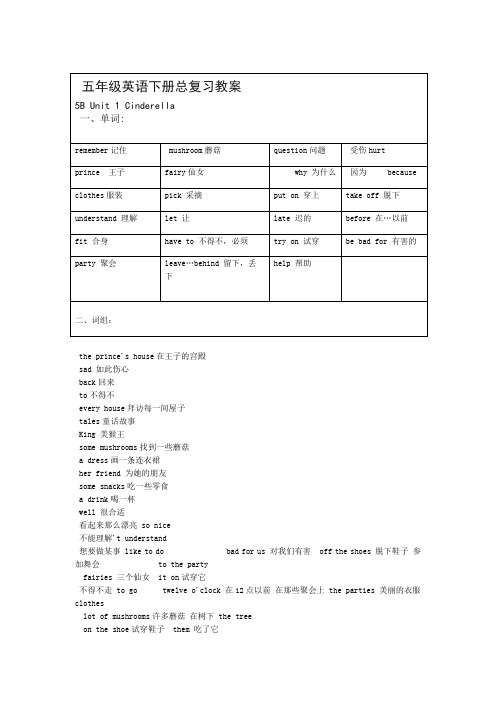
the prince's house在王子的宫殿sad 如此伤心back回来to不得不every house拜访每一间屋子tales童话故事King 美猴王some mushrooms找到一些蘑菇a dress画一条连衣裙her friend 为她的朋友some snacks吃一些零食a drink喝一杯well 很合适看起来那么漂亮 so nice不能理解't understand想要做某事 like to do bad for us 对我们有害 off the shoes 脱下鞋子参加舞会 to the partyfairies 三个仙女 it on试穿它不得不走 to go twelve o'clock 在12点以前在那些聚会上 the parties美丽的衣服clotheslot of mushrooms许多蘑菇在树下 the treeon the shoe试穿鞋子 them 吃了它找到女孩 the girlcan't you…你为什么不能……behind丢下…up 赶快some drinks 找到一些饮料question words一些疑问词me 适合我a picture for me 为我画一幅画a drink喝一份饮料so nice 看起来那么漂亮at school 在校学习a story about…读一个有关…的故事42. pick a big and red mushroom采一个又大又红的蘑菇三、句子:and help me.过来帮我。
are you so sad, dear?亲爱的,为什么你这样伤心?I don't have any nice clothes or shoes.因为我没有任何漂亮的衣服和鞋子。
up!快点!can eat them.我们可以吃它们了。
a pity!真可惜!can't you go to the party?你为什么不能去参加舞会?foot hurts! 我的脚受伤了!like reading stories about the Monkey King and Nezha. 我喜欢读猴王和哪吒的故事。
译林小学英语五年级下册期中复习——必记必背知识清单(Unit1_4)
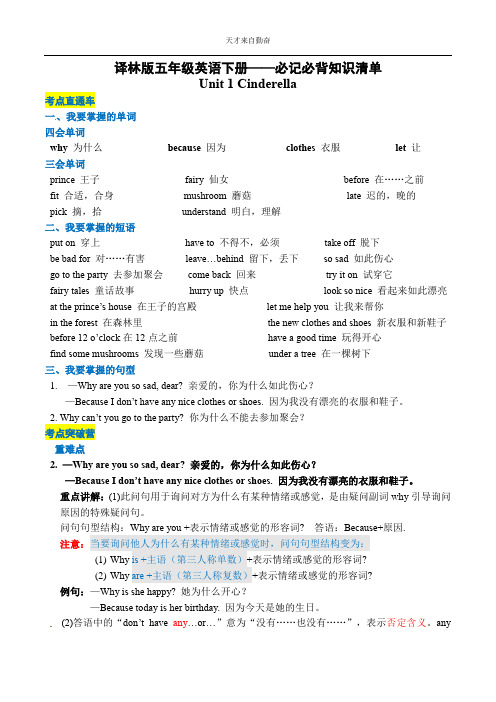
译林版五年级英语下册——必记必背知识清单Unit 1 Cinderella考点直通车一、我要掌握的单词四会单词why为什么because因为clothes衣服let让三会单词prince 王子fairy 仙女before 在……之前fit 合适,合身mushroom 蘑菇late 迟的,晚的pick 摘,拾understand 明白,理解二、我要掌握的短语put on 穿上have to 不得不,必须take off 脱下be bad for 对……有害leave…behind 留下,丢下so sad 如此伤心go to the party 去参加聚会come back 回来try it on 试穿它fairy tales 童话故事hurry up 快点look so nice 看起来如此漂亮at the prince’s house 在王子的宫殿let me help you 让我来帮你in the forest 在森林里the new clothes and shoes 新衣服和新鞋子before 12 o’clock在12点之前have a good time 玩得开心find some mushrooms 发现一些蘑菇under a tree 在一棵树下三、我要掌握的句型1.—Why are you so sad, dear? 亲爱的,你为什么如此伤心?—Because I don’t have any nice clothes or shoes. 因为我没有漂亮的衣服和鞋子。
2. Why can’t you go to the party? 你为什么不能去参加聚会?考点突破营重难点2.—Why are you so sad, dear? 亲爱的,你为什么如此伤心?—Because I don’t have any nice clothes or shoes. 因为我没有漂亮的衣服和鞋子。
译林版小学英语五年级下册知识点归纳汇总资料

5B译林五年级英语下册知识点Unit 1 Cinderella一、单词:remember 记住(forget 忘记)mushroom蘑菇question 问题(answer me 回答我)hurt 受伤prince 王子fairy 仙女why 为什么because 因为clothes 服装pick 采摘put on 穿上take off 脱下understand 理解let 让late 迟的(早的early)before 在, 以前fit 合身have to 不得不,必须= musttry on 试穿be bad for 有害的(be good for )party 聚会leave behind 留下,丢下help 帮助help me二、词组:at the prince’s house 在王子的宫殿so sad 如此伤心come back 回来have to 不得不visit every house 拜访每一间屋子fairy tales 童话故事Monkey King 美猴王find some mushrooms 找到一些蘑菇draw a dress 画一条连衣裙for her friend 为她的朋友have some snacks 吃一些零食have a drink 喝一杯fit well 很合适look so nice 看起来那么漂亮can ’t understand 不能理解would like to do 想要做某事be bad for us 对我们有害take off the shoes 脱下鞋子go to the party 参加舞会three fairies 三个仙女(单数fairy)try it on 试穿它have to go 不得不走before twelve o ’clock 在12点以前at the parties 在那些聚会上beautiful clothes 美丽的衣服 a lot of mushrooms 许多蘑菇under the tree 在树下try on the shoe 试穿鞋子eat them 吃了它find the girl 找到女孩why can ’t you, 你为什么不能leave behind 丢下,hurry up 赶快find some drinks找到一些饮料some question words 一些疑问词fit me 适合我draw a picture for me 为我画一幅画have a drink 喝一份饮料look so nice 看起来那么漂亮be at school 在校学习read a story about, 读一个有关…的故事pick a big and red mushroom 采一个又大又红的蘑菇三、句子:e and help me. 过来帮我。
牛津译林版英语五年级下册期中知识点归纳
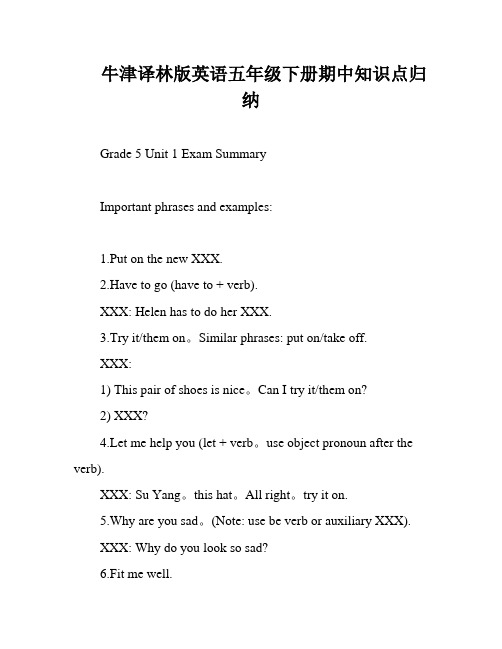
牛津译林版英语五年级下册期中知识点归纳Grade 5 Unit 1 Exam SummaryImportant phrases and examples:1.Put on the new XXX.2.Have to go (have to + verb).XXX: Helen has to do her XXX.3.Try it/them on。
Similar phrases: put on/take off.XXX:1) This pair of shoes is nice。
Can I try it/them on?2) XXX?4.Let me help you (let + verb。
use object pronoun after the verb).XXX: Su Yang。
this hat。
All right。
try it on.5.Why are you sad。
(Note: use be verb or auxiliary XXX).XXX: Why do you look so sad?6.Fit me well.XXX:1) XXX A)2) I often swim on Sundays。
but my sister doesn't。
(n A)7.XXX.8.Want to do something。
(Would like to + verb)XXX:1) Would you like some mushrooms。
(n A)2) He wants to see a film.9.Be bad/good for。
XXX:1) Reading is good for our study。
(n B)2) Water is good for us。
(n C)10.XXX。
XXX.XXX。
XXX.1.XXX had XXX.2.Who has to go back now?3.XXX.4.XXX?5.The food is bad。
译林版五年级英语下册知识点归纳

5B Unit 1 Cinderella一、单词:1. prince /prɪns/王子2. fairy / ˈfeərɪ/ 仙女3. sad / sæd/伤心4. because / bɪˈkɒz/因为5. back / bæk/回来6. fit / fɪt/合适7. hurt / hɜ:t/受伤8. late / leɪt/ 迟到9. tale /teɪl/ 故事10. hurry / ˈhʌrɪ/快点11. pick / pɪk/摘12. mushroom / ˈmʌʃrʊm/ 蘑菇13. pity /ˈpɪtɪ/可惜14. leave / li:v/留下15. clothes /kləʊðz/ 衣服16.crystal / ˈkrɪstl/水晶二、词组:1. at the prince’s house 在王子的宫殿2. Cinderella灰姑娘e and help me 过来帮我4. my gloves 我的手套5. A fairy comes 一位仙女来了6.so sad 如此伤心7. go to the party 去参加聚会8.nice shoes 漂亮的鞋子9. I don’t have any nice clothes or shoes .我没有漂亮的衣服和鞋子10. Let me help you. 让我来帮你。
11.put on穿上12. take off 脱下13. put on the new clothes and shoes 穿上新衣服和鞋子14.come back 回来15. before 12 o’clock 12点钟之前16.have a good time 玩得开心17.at the party 在聚会中18. have to go 不得不走19. visit every house 参观每一间屋子20.try on your shoe试穿你的鞋子21. try it on 试穿它22. try them on 试穿它们23.It fits .它合适。
(完整word版)译林牛津英语小学五年级下册重点

(完整word版)译林牛津英语小学五年级下册重点三、句子:e and help me.过来帮我。
2.Why are you so sad, dear?友爱的,为啥你如此伤感?3.Because I don’t have any nice clothes or shoes.因为我没有任何美丽的衣服和鞋子。
4.Hurry up!快点!5.We can eat them.我们能够吃它们了。
6.What a pity!真惋惜!7.Why can’t you go to the party?你为啥别能去参加舞会?8.My foot hurts! 我的足受伤了!9.I like reading stories about the Monkey King and Nezha. 我喜爱读猴王和哪吒的故事。
10.Because these mushrooms are bad for us.因为这些蘑菇对我们有害的。
11.Cinderella has a good time at the party. 灰小姐在舞会上度过了美好时光。
12.Many girls try on the shoe, but it does not fit.许多少女试穿这只鞋,然而别合适。
13.Why is Yang Ling not at school today? 杨玲为啥今天别在学校?14.Why does Nancy take off her coat?南希为啥脱下她的外套?15.She leaves a shoe behind. 她留下一只鞋。
解析:do是助动词,其第三人称单数形式是does,否定形式分不为:don’t 和doesn’t。
助动词开头的句子是普通疑咨询句,普通用“Yes,…do/does.”或“No,…don’t/doesn’t.”来回答。
2.Where do you live?你住在哪里?解析:where是特别疑咨询词,用来引导特别疑咨询句,其回答别能简单地回答yes或者no,而是要依照具体所咨询来回答,比如这个地方能够用“I live+表示方位的词语”来回答。
牛津译林版五年级下册英语知识点总结归纳

牛津译林版五年级下册英语知识点总结归
纳
本文档旨在总结归纳牛津译林版五年级下册英语的知识点,以帮助学生复和巩固所学内容。
1. Unit 1: Our Hobbies
- 介绍和询问自己和他人的兴趣爱好
- 表达喜欢和不喜欢的事物
- 使用动词进行句型表达
2. Unit 2: Festivals Around the World
- 研究世界各地的节日
- 描述节日的时间、地点和活动
- 了解并尊重不同文化之间的差异
3. Unit 3: Seeing a Doctor
- 研究有关身体健康和看病的词汇
- 运用句型表达身体不适和寻求医生的帮助- 掌握使用应急电话号码的方法
4. Unit 4: Animal World
- 了解不同种类的动物
- 描述动物的特征和性
- 研究保护动物和环境的重要性
5. Unit 5: On the Farm
- 研究农场生活的词汇和短语
- 描述农场的不同活动和工作
- 探讨农场对人类生活的重要性
6. Unit 6: At the Airport
- 研究有关机场和旅行的词汇
- 运用句型表达旅行计划和经历
- 掌握基本的旅行常识和规则
以上是牛津译林版五年级下册英语的主要知识点总结,学生可根据此文档进行复习和整理。
译林版五下英语知识点总结
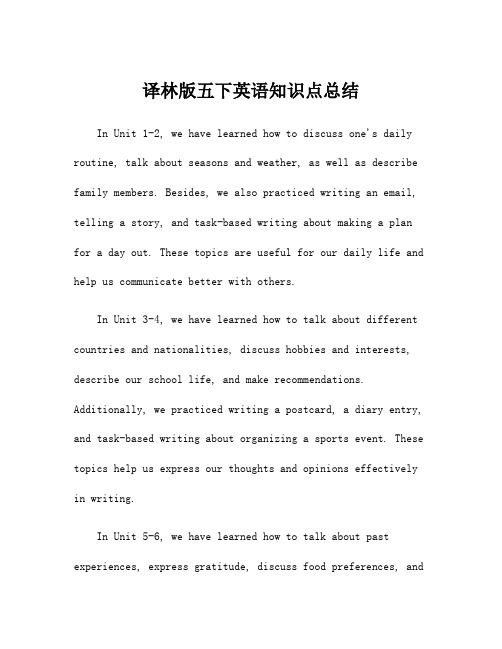
译林版五下英语知识点总结In Unit 1-2, we have learned how to discuss one's daily routine, talk about seasons and weather, as well as describe family members. Besides, we also practiced writing an email, telling a story, and task-based writing about making a plan for a day out. These topics are useful for our daily life and help us communicate better with others.In Unit 3-4, we have learned how to talk about different countries and nationalities, discuss hobbies and interests, describe our school life, and make recommendations. Additionally, we practiced writing a postcard, a diary entry, and task-based writing about organizing a sports event. These topics help us express our thoughts and opinions effectively in writing.In Unit 5-6, we have learned how to talk about past experiences, express gratitude, discuss food preferences, anddescribe a festival. We also practiced writing a letter of complaint, a recipe, and task-based writing about promoting a healthy lifestyle. These topics enhance our writing skills and help us convey our ideas clearly to others.Overall, the knowledge points in Yilin Book 5 have enriched our vocabulary, improved our grammar and writing skills, and provided us with valuable communication strategies. It is essential to practice regularly and apply what we have learned in our daily lives to become proficient in English.。
- 1、下载文档前请自行甄别文档内容的完整性,平台不提供额外的编辑、内容补充、找答案等附加服务。
- 2、"仅部分预览"的文档,不可在线预览部分如存在完整性等问题,可反馈申请退款(可完整预览的文档不适用该条件!)。
- 3、如文档侵犯您的权益,请联系客服反馈,我们会尽快为您处理(人工客服工作时间:9:00-18:30)。
五年级下册各单元考点总结U1【重要词组和例句】1.穿上新衣服put on the new clothes2.不得不走have to go (have to +动原)Helen ______ (have) to ______ (do) her homework.3.试穿他/他们try it/them on★代词it/them放中间try的三单tries同类词组:put on /take off1)This pair of shoes is nice. Can I try ____(it/them) on2)Whose shoe ________ the girls ________(try) on.4.让我来帮你let me help you (let +动原,动词后用宾格) (祈使句否定句首+don’t)-Su Yang,this hat. --All right.A. try onB.tries onC. try it on为什么你看上去如此伤心why do you look sad?6.非常适合我fit me well1)The shoes fit every one. A. doesn't B. don't C. isn't2)I often ______ on Sundays, but my sister ______.A. swim; doesn’tB. swimming; doesn’tC. swim; don’t7.上学迟到be late for school8.想要做某事want to +动原= would like to +动原1)Would you like mushrooms? A. some B. any C. a2)He ______ (want) ________ (see) a film.9.对……有害/有利be bad/good for…1)Reading our study. A. are good for B. is good for C. is bad for2)Water good for . A. are;us B.is;our C.is;us10.留下……le ave…behind灰姑娘留下了什么?—她留下了一只鞋。
What _____ Cinderella leave ______? --- She _______ a shoe _______.【易错题】1.Cinderella has no nice clothes ______ shoes. A. and B. or C. with2.Who_________(have) to go back now?3.Bobby doesn't understand. (改为肯定句)4.Many girls try on Cinderella’s shoe. (对划线提问)______ many girls ____________?5.The food is bad. We can’t eat________. A. them B. it C. us6.Does Nancy take off her coat?(改为陈述句)7.It fits me. (改为一般疑问句)8.What’s five plus(加) eight? ______ thirteen.A. It’s B. They’re C. IsU2 -3【重要词组和例句】Array 1.在月亮街on Moon Street在阳光镇in Sunshine Town在公园站at Park Station在公共汽车站at the bus stop2.在街上on the street(美)/in the street(英)There is a bookshop on the street.There are too many cars in the street.3.by 和take 的用法by (介词,表示方式,有靠、用、通过、乘的意思。
)take (动词,乘坐某种交通工具)例:go to school by bus/plane/ship/taxi/train/metro (go to 地点by +交通工具)=take a bus/plane/ship/taxi/train/metro to school(take a +交通工具to 地点)乘5路车take Bus No. 54.walk to school = go to school on footwalk home/here/there=go home/here/there on foot (home/here/there是副词,前面不加介词)5.ride a bike to school = go to school by bikeride a bike home = go home by bike6.上车get in /get onget in 一般用于与小汽车、出租车等小型交通工具,而get on 用于公共汽车、火车、飞机、轮船等大型交通工具。
另乘坐小型交通工具,下车一般用get out of。
如:get in the car/taxi get out of the car/taxiget on the train/bus/plane/ship get off the bus/train/plane/ship7.问路(ask the way)以zoo为例,几种问路的句型:----Excuse me, How do I get to the zoo?How do I get there?----Excuse me, can you tell me the way to the zoo, please?----Can you tell me how to get to the zoo?8.几种常见的指路用语:Go/Walk along ... 沿着……走Turn left/right at ... 在……向左转/右转You can see ... on your left/right. 你能在你的左侧/右侧看到……9.at the traffic lights/crossing 在红绿灯处/十字路口at the first/second/third traffic lights 在第一/二/三个红绿灯处e out from… 从…出来11.ask sb for help 向(某人)求助12.show/send/write/give sth to sb= show/send/write/give sbsthbuy sth for sb13.The bus is full. 汽车坐满人了。
词组:be full of…,例:The basket is full of apples. 篮子里装满了苹果14.be over意为“结束了”。
例:School is over. 放学了。
15.特殊疑问词how的用法。
①(表方式、方法)怎样;怎么My father goes to work by car. ------ How does your father go to work(去工作)?How do you usually go to school? 你怎样去上学? (交通方式)How does she study English? 她是怎样学习英语的?②(指健康等情况)怎样How is Miss Zhang? 张小姐身体好吗?—How are you? —Fine, thank you.How do you feel? 你感觉怎么样?③(询问天气)怎样How is the weather in Beijing? 北京的天气怎样?相当于What’s the weather like in Beijing?16.I do n’t know which to choose. 我不知道选哪一个。
(特殊疑问词+ to do 做宾语)例:Can you tell me how to get there?【易错题】1.Lucy always _____ home by bike. A. goes to B. goes C. go2._____you often late_______school? A. Do, forB. Are, for C. Are, to3.The wheels on the bus______(go) round and round.4.I can’t see any (taxi) in the street.5.There(be)any water in the cup.6.We often go on Sundays. A. to there B. here C. there7.Can you _______your bike ________me?A. show, for B. show, to C. showing, with8._______ uncle works_______ a big ship? A. My, in B. I, on C. My, on9.I'm free today. What about ____? A. go fishing B. going fishing C. go to fish10.Mike, _____ off the metro at Park Station. A. Get B. gets C. get11.Do you know the way _____ the bus stop?A.at B.to C. on12.In ,they ask “Where is the restroom?” A. the UK B. the US C. China13.I don’t know how ______ (get) to the park.14.Please tell me which one(choose).15.Let her(take)the bus to the park.16.The bag is full of (mango).17.My brothers are ________ (drive), they like(drive)my car.18.I help in the supermarket.对划线部分提问)_______ _______ in the supermarket?19.I can eat and drink. (改为否定句)20.He can’t get out because he is too fat. (划线部分提问)_______ _______ he get out?21.Walk along the street. (改为否定句)___________________________U4【重要词组和例句】1.生病be ill/sick一只病猫asick cat (√)a ill cat (×)2.去看医生/牙医go to see the doctor/dentist3.你怎么啦?What’s wrong withyou? (me/us/her/him/it/them) =What’s the matter with you?介词+宾格wrong与something, anything, nothing等连用,表示“出事”,“有毛病”例:There is something wrong with my bike. 我的自行车看起来有些不对劲。
